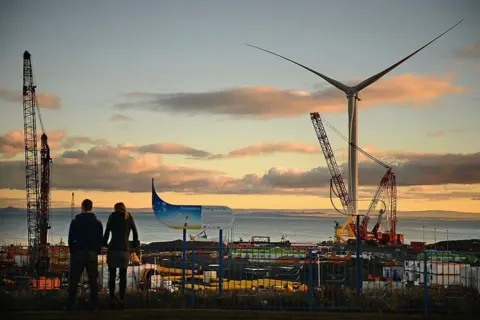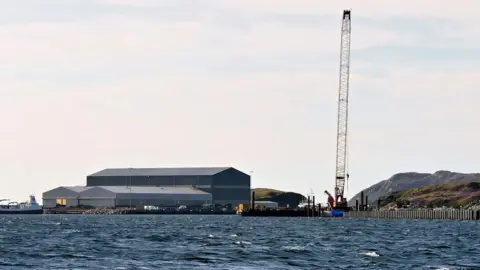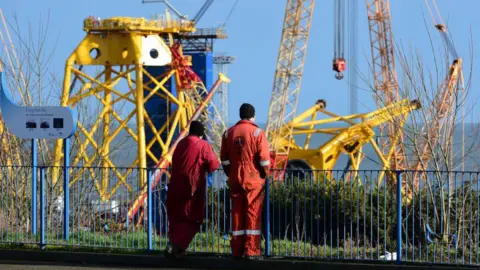Hundreds of Harland & Wolff jobs saved in Scotland
 Getty Images
Getty ImagesA buy-out of shipbuilder Harland & Wolff has secured the future of 350 jobs in Scotland, the UK government has said.
The Belfast-based company, which owns fabrication yards in Arnish in Lewis and Methil in Fife, was placed into administration in September.
It has been taken over by Spain's state-owned shipbuilder, Navantia, in a deal backed by the UK government and involving 1,000 UK jobs in total.
Trade unions have welcomed the move, but warned new orders were needed to keep the yards busy.
 David Dixon/Geograph
David Dixon/GeographScottish Secretary Ian Murray said skilled Scottish jobs in communities in the Western Isles and Fife had been secured.
He added: "Navantia's investment will not only secure the future of all four UK yards, but also encourage future support for UK shipbuilding and fabrication - a vital cornerstone of our defence and clean energy sectors."
Matt Roberts, national officer with the GMB union, said the buy-out was a positive step to retaining manufacturing in the UK.
"Without a steady drum beat of work these yards will continue to struggle. GMB will continue the fight to ensure that does not happen," he said.
Unite general secretary Sharon Graham said the union had been working "day and night" to secure the interests of the workers at Harland & Wolff.
She said: "After countless meetings with government, the employer, and prospective buyers, we now have a good news story offering real hope for the future. Unite will always do whatever it takes to fight for workers' interests."
The Scottish yards were owned by BiFab before being taken over by Harland & Wolff.
Work at the sites have included contracts to make wind farm turbine components.
Arnish near Stornoway was founded in 1974 with backing from Norwegian company Olsen's.
Contracts in the early days included constructing a large barge.
The yard was also later used for repurposing rigs for the North Sea oil and gas industry.
Methil has a long history of shipbuilding.
In 2013 the yard was used for testing what was at the time the world's largest and most powerful installed wind turbine.
Both yards have frequently experienced risks of closure and job losses and are important employers in their areas.
 Getty Images
Getty ImagesWestern Isles SNP MSP Alasdair Allan said the buy-out was "great news" for workers at Arnish, their families and the wider economy of the Western Isles.
He said: "It's certainly a welcome announcement as people prepares for the Christmas break.
"Navantia appear to have a strong record in the maritime industry with strong financial backing and a plan for the future."
Western Isles Labour MP Torcuil Crichton said: "There are over 150 jobs at the yard, from apprentices to journeymen, and losing those jobs and that wage bill would have been a major blow to the economy."
Donald Crichton, a senior islands councillor, said he was delighted for employees and their families.
He added: "The past months have been a stressful time for all connected with the yard and they are to be commended for their continued professionalism and resilience."

The deal to sell the assets of the former Harland & Wolff group to Spain's state-owned shipbuilder Navantia comes with a sweetener from the UK government.
To ensure all four yards are taken on, with jobs guaranteed for at least two years and three for Belfast, the Ministry of Defence renegotiated the contract it had already signed with Navantia, to build three large support ships for the Royal Navy, most of that work to be sub-contracted to Harland & Wolff in Belfast.
So while it's seen as a new type of working relationship with European neighbours post-Brexit, and presented as an example of the Labour government's industrial strategy to support and grow key sectors -and it may be a bit both - the deal appears to owe more to necessity, pragmatism and politics than to strategy.
It's claimed that Navantia did not initially want to take on the Scottish yards, because they're not core to its shipbuilding business. For half a century, they have been in steel fabrication, and their job now is to make themselves useful to their new owners, making parts of ships for assembly in Belfast, and winning business from the offshore energy sector.
In Methil and Stornoway, they have seen boom and bust in employment, as orders and owners have come and gone. Unions now want to see these yards becoming sustained and successful, rather than merely surviving.
That requires a change of mindset for UK shipbuilding and fabrication: to rely less on one-off or short-run orders, or on the Ministry of Defence, and to compete efficiently by producing multiple copies of structures as if on assembly lines.
They're already doing that in building 30 barges for transporting waste on the River Thames. New ownership brings in Spanish expertise, as a successful state-owned exporter, to embed that approach and to fabricate a more reliable future.
